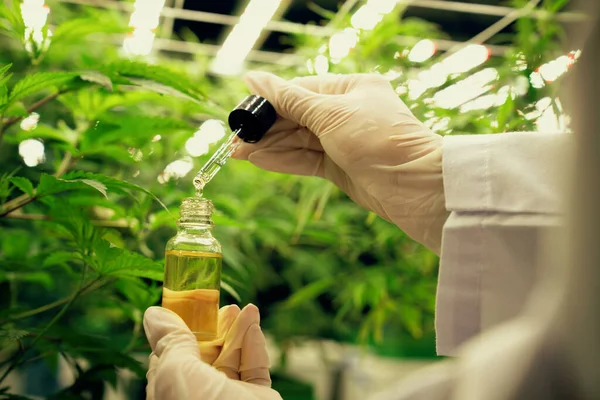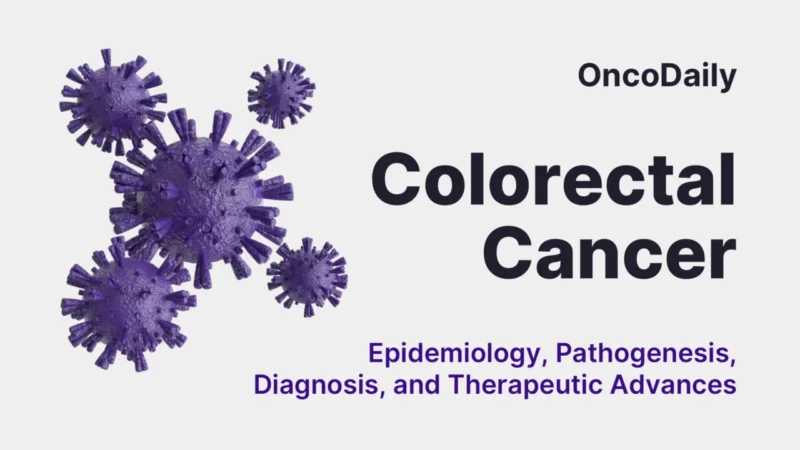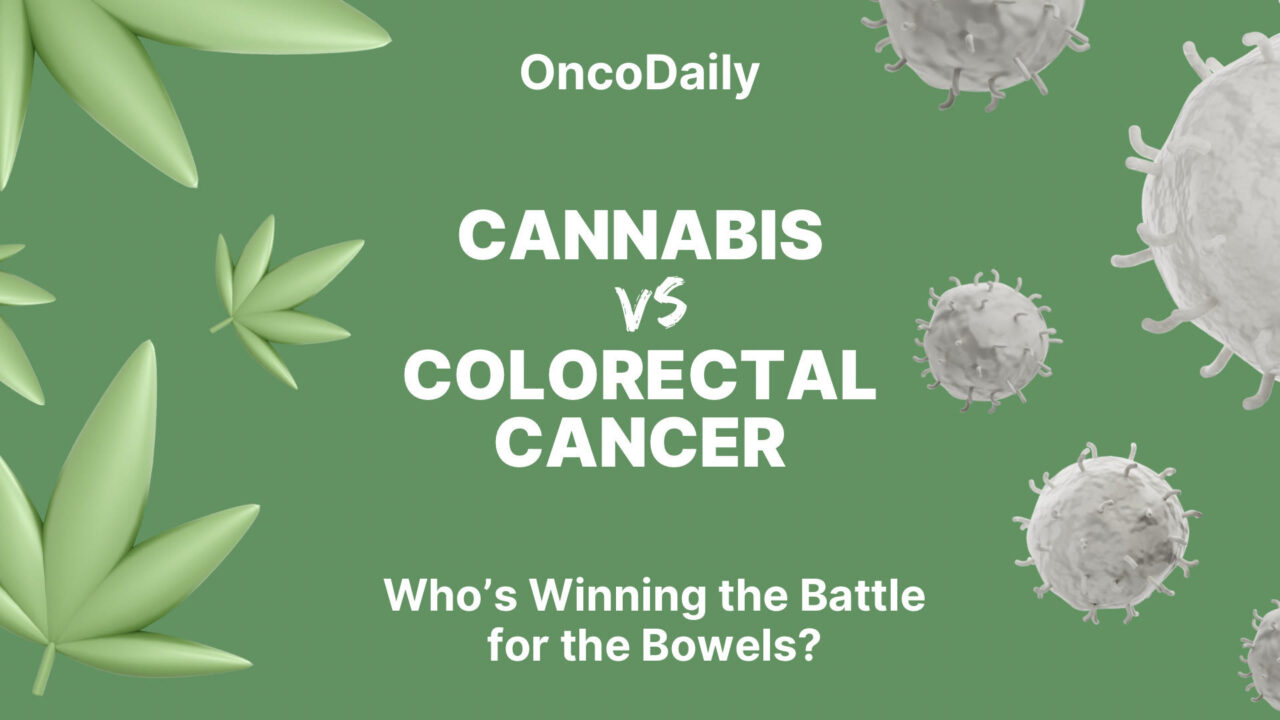Colorectal cancer (CRC) remains one of the most common and deadly cancers worldwide. In 2025, it is projected that approximately 154,270 new cases of colorectal cancer will be diagnosed in the United States alone, with an estimated 52,900 deaths attributed to this disease. CRC affects about 7.6% of all new cancer cases in the U.S., making it the fourth most common cancer among men and women combined.
Notably, there is an alarming rise in CRC incidence among individuals under 50 years, with younger adults experiencing increasing diagnosis rates annually. CRC typically originates in the lining of the colon or rectum and profoundly disrupts bowel function through tumor growth, obstruction, bleeding, and inflammation, negatively impacting patients’ quality of life and requiring complex therapeutic approaches.

Explore the rising incidence of colorectal cancer and cannabis use in managing bowel complications, symptom relief, and potential anticancer effects. This article reviews the latest research on cannabis as a complementary therapy to improve quality of life and outcomes in colorectal cancer patients.
Photo: Depositphotos
How Does Cannabis Use Impact Gastrointestinal Symptoms and Symptom Management in Oncology?
Cannabis and its derivatives have gained increasing interest in oncology for their potential to manage symptoms associated with both cancer and its treatments. The endocannabinoid system, which cannabis interacts with, plays a critical role in gastrointestinal processes including motility, secretion, inflammation, and pain perception. Clinical and preclinical studies have demonstrated that cannabinoids may alleviate common gastrointestinal symptoms in cancer patients such as nausea, vomiting, pain, and chemotherapy-induced mucositis. As a result, cannabis is being considered as a complementary therapy to improve symptom management and enhance quality of life in oncology settings, including for patients with colorectal cancer. Husam A ALSalamat, J Cannabis Res. 2024
Rationale for Exploring Cannabis as a Therapeutic Option in Colorectal Cancer Bowel Complications
Considering the high prevalence of bowel complications in colorectal cancer and the multidimensional effects of cannabis on gastrointestinal physiology and cancer pathology, investigating cannabis as a therapeutic option is scientifically and clinically justified. Cannabis may not only mitigate distressing bowel symptoms but also exhibit anticancer properties through modulation of molecular pathways and the gut microenvironment. Understanding its role could lead to integrative treatment strategies that enhance symptom control, reduce reliance on conventional pharmaceuticals like opioids, and possibly influence tumor behavior. This makes the exploration of cannabis in the context of colorectal cancer bowel health a critical frontier for improving patient outcomes. Walid Shalata, Cancers (Basel). 2024
Biology of Colorectal Cancer and Its Effects on Bowel Function
Colorectal cancer (CRC) develops through a series of molecular and genetic alterations that transform normal colonic epithelial cells into malignant tumors. Key mechanisms include chromosomal instability (CIN), microsatellite instability (MSI), and epigenetic modifications such as CpG island methylation (CIMP). Early mutations frequently involve the tumor suppressor gene APC, leading to aberrant activation of the Wnt/β-catenin pathway, which promotes uncontrolled cellular proliferation and inhibits apoptosis. Additional mutations in oncogenes (KRAS, BRAF) and tumor suppressors (TP53) further drive tumor progression and metastasis.
CRC tumors disrupt normal bowel function by obstructing the intestinal lumen, causing bleeding, inflammation, and altered motility. These changes contribute to symptoms such as constipation, diarrhea, abdominal pain, and fecal incontinence, significantly impairing patients’ lives. Furthermore, treatments such as surgery and chemotherapy can exacerbate bowel dysfunction through mucosal damage and inflammatory responses.
Endocannabinoid System (ECS) in the Gut and Its Relevance to Cancer and Bowel Health
The ECS comprises cannabinoid receptors (CB1 and CB2), endogenous ligands (anandamide and 2-arachidonoylglycerol), and enzymes for their synthesis and degradation. These components are abundantly expressed throughout the gastrointestinal tract, where ECS signaling regulates motility, secretion, inflammation, and visceral pain. Dysregulation of the ECS has been linked to gastrointestinal disorders and cancer. In CRC, activation of cannabinoid receptors can modulate tumor cell proliferation, induce apoptosis, and influence the tumor microenvironment, including immune and inflammatory responses. The ECS thereby represents a critical link between bowel physiology and cancer progression, making it a promising target for therapeutic intervention. Temitope O Keku, Am J Physiol Gastrointest Liver Physiol. 2014
Cannabis and Cannabinoids: Types, Pharmacology, and Mechanisms of Action in Bowel Physiology
Cannabis contains over 100 phytocannabinoids, with THC and CBD being the most studied for therapeutic effects. THC acts primarily as a partial agonist at CB1 and CB2 receptors, producing psychoactive and medicinal effects, including analgesia and anti-inflammatory actions. CBD has a more complex pharmacology, interacting with multiple receptor systems including ECS-related and non-ECS targets, contributing to its anti-inflammatory, anti-cancer, and neuroprotective properties. In the bowel, cannabinoids modulate gastrointestinal motility, reduce inflammation, and modulate nociceptive signaling, which may relieve symptoms such as pain, nausea, and diarrhea.
They also have been shown to affect the gut microbiota, potentially influencing bowel health and disease progression. These multifaceted actions support the investigation of cannabinoids as agents for both symptomatic relief and possible modulation of colorectal cancer progression. Md Moniruzzaman, ACS Pharmacology & Translational Science 2025

Photo: Depositphotos
Does Cannabis Have Anticancer Potential in Colorectal Cancer?
Extensive preclinical studies have demonstrated that cannabinoids exert significant anticancer effects in colorectal cancer (CRC) through multiple mechanisms. Key cannabinoids such as tetrahydrocannabinol (THC), cannabidiol (CBD), and cannabigerol (CBG) have been shown to induce apoptosis, inhibit tumor cell proliferation, suppress angiogenesis, and reduce metastasis in CRC models.
Preclinical Evidence of Cannabinoids Inducing Apoptosis and Inhibiting Proliferation
CBG induced apoptosis in CRC cell lines (Caco-2, HCT-116) by stimulating reactive oxygen species (ROS) production, increasing expression of CHOP mRNA, and activating caspases 3 and 7. In animal models, CBG inhibited tumor growth by over 45% and suppressed chemically induced colon carcinogenesis, reducing aberrant crypt foci and tumor numbers. CBD exhibited antiproliferative effects mediated by activation of CB1, TRPV1, and PPAR-γ receptors, protecting cells from oxidative stress, and inducing endoplasmic reticulum stress leading to apoptosis via Noxa activation.
In vivo, CBD reduced tumor formation and angiogenesis by inhibiting vascular endothelial growth factor (VEGF) and enhancing antioxidant enzyme activity. THC was found to induce apoptosis through activation of CB1 receptors and inhibition of PI3K-AKT, RAS-MAPK signaling cascades, leading to caspase-3 activation and BAD protein dephosphorylation, resulting in dose-dependent reductions in CRC cell viability.
Molecular Signaling Pathways Involved
The anticancer effects of cannabinoids in CRC involve several molecular pathways:
- Activation of cannabinoid receptors CB1 and CB2 modulates cell survival and apoptosis.
- Inhibition of PI3K-AKT and RAS-MAPK pathways disrupts proliferative signaling.
- Induction of ROS and endoplasmic reticulum stress triggers pro-apoptotic proteins such as Noxa.
- Caspase activation leads to programmed cell death.
- Suppression of angiogenesis through VEGF inhibition decreases tumor blood supply.
Comparative Effects of THC, CBD, and Combination Extracts
While THC primarily induces apoptosis and inhibits proliferation via CB1 receptor activation and downstream signaling, CBD acts through a wider range of receptors and mechanisms including anti-oxidative and anti-inflammatory pathways. Combination extracts, especially those rich in CBD, show antiproliferative properties comparable to pure CBD, with potential synergistic effects from minor cannabinoids and terpenes. Importantly, these effects appear selective for cancer cells, sparing healthy colonic epithelial cells. Animal studies confirm that both isolated cannabinoids and botanical cannabis extracts reduce tumor volume and occurrence in CRC models. Daniel A Ladin,Front Pharmacol. 2016, Mariia Zaiachuk,Front Med (Lausanne). 2021
Cannabis Use for Symptom Management in Colorectal Cancer Patients
Cannabis has been increasingly utilized in oncology to manage distressing symptoms associated with colorectal cancer (CRC) and its treatments. Common bowel-related symptoms in CRC patients that cannabis may alleviate include pain, nausea, vomiting, appetite loss, and inflammation.
Efficacy in Managing Bowel Symptoms
Cannabinoids interact with the endocannabinoid system in the gastrointestinal tract to reduce inflammation, modulate pain perception, and control nausea and vomiting. Clinical and preclinical studies show that cannabinoids like THC, CBD, and cannabigerol (CBG) can mitigate chemotherapy-induced nausea and vomiting, reduce abdominal pain, improve appetite, and alleviate inflammatory bowel symptoms. For instance, CBD has demonstrated anti-inflammatory and antiproliferative effects, while THC activates cannabinoid receptors involved in pain and nausea pathways. Botanical cannabis extracts rich in CBD and THC have also shown efficacy in reducing gastrointestinal symptoms in CRC models and patients.
Clinical Data on Safety, Tolerability, and Quality of Life Improvements
A large clinical study of 2,970 cancer patients, including 7.9% with colorectal cancer, reported significant symptom relief with medical cannabis use. Patients experienced improvements in pain, nausea, vomiting, sleep disorders, and appetite, leading to enhanced quality of life. Before cannabis treatment, only 18.7% reported good quality of life; this increased to 69.5% at six months. Cannabis was well-tolerated with common side effects including dizziness, dry mouth, and increased appetite. Psychoactive adverse effects were rare (2.8%). Importantly, 36% of patients on opioids discontinued their use after initiating cannabis, highlighting its potential in opioid sparing.
Impact on Opioid Use Reduction and Chemotherapy-Induced Side Effects
Cannabis may reduce the need for opioids by providing effective analgesia and improving tolerability of chemotherapy. Clinical reports and meta-analyses indicate that cannabinoids can alleviate multiple chemotherapy-induced adverse effects such as nausea, vomiting, and neuropathic pain, potentially enhancing treatment adherence and patient comfort. This opioid-sparing effect is particularly valuable given the risks of opioid dependence and side effects in cancer populations.
Potential Synergistic Effects of Cannabinoids with Current Colorectal Cancer Therapies
Cannabinoids have been shown to modulate key pathways involved in cancer cell proliferation, apoptosis, and metastasis, presenting a rationale for potential synergy with existing colorectal cancer (CRC) therapies. Preclinical studies suggest cannabinoids may enhance the effectiveness of chemotherapy by sensitizing tumor cells to anticancer agents and reducing drug resistance. Cannabinoid receptor activation influences signaling cascades such as PI3K-AKT and MAPK that are critical in tumor growth, thereby potentially improving therapeutic outcomes when combined with chemotherapy. However, clinical data remain limited, and the effects appear to be complex and dose-dependent.
Modulation of Immune Response and Tumor Microenvironment by Cannabinoids
The immunomodulatory properties of cannabinoids impact the tumor microenvironment, influencing immune cell infiltration, cytokine profiles, and inflammation in colorectal cancer. Cannabinoids primarily exert immunosuppressive effects through CB2 receptor signaling, which may reduce inflammation but also modulate antitumor immune responses. Some studies indicate cannabinoids may attenuate immune-related adverse events (ir-AEs) associated with immune checkpoint inhibitor (ICI) immunotherapy, potentially improving tolerance. Conversely, there is evidence that high cannabinoid doses could impair the efficacy of immunotherapies by suppressing T-cell mediated cytotoxicity. Thus, the impact of cannabinoids on immunotherapy is nuanced, underscoring the importance of cannabinoid type, receptor specificity, dosage, and timing when combined with immunotherapy. MariaLusia Vigano, Front. Immunol, 2025
Considerations and Limitations in Clinical Application
Despite promising mechanistic data, clinical application of cannabinoids alongside immunotherapy and chemotherapy faces challenges. Variability in cannabis compound composition, route of administration, pharmacokinetics, and patient genetics (including cannabinoid receptor polymorphisms) contribute to inconsistent outcomes. Drug-drug interactions mediated by cytochrome P450 enzymes and the influence of gut microbiota further complicate therapeutic effects. Moreover, preclinical models do not fully capture the heterogeneity of human CRC immunobiology or the complexity of immune checkpoint therapies. Current clinical evidence is insufficient to recommend routine combined use of cannabinoids with cancer therapies without further controlled trials. Personalized approaches exploring specific cannabinoid compounds with minimal immunosuppressive effects, such as cannabidiol (CBD) and cannabigerol (CBG), hold promise for future integrative strategies. Brian J Piper Cancers (Basel). 2024
Every patient considering cannabis for colorectal cancer or any medical condition must consult their healthcare professional first. Using cannabis without proper medical guidance can be dangerous, leading to harmful side effects, negative interactions with other treatments, or worsening health. Always follow your doctor’s advice and treatment plan to ensure safe use and avoid serious risks to your wellbeing.

You Can Also Read Colorectal Cancer: Epidemiology, Pathogenesis, Diagnosis, and Therapeutic Advances by OncoDaily
Gut Microbiota, Cannabis, and Cancer
Recent studies reveal a complex bidirectional relationship between cannabis use and the gut microbiota. The gut microbiota can metabolize cannabinoids such as Δ9-tetrahydrocannabinol (THC), modifying their potency and duration of effects. Cannabis consumption has been shown to alter gut microbial populations, for instance increasing beneficial bacteria like Akkermansia muciniphila, which supports gut barrier integrity and metabolic health. Changes in microbial abundance and diversity induced by cannabinoids may impact inflammation, motility, and immune responses in the gastrointestinal tract. This microbiome-cannabis interplay suggests that modulating gut microbiota could influence cannabinoid efficacy and side effects in cancer treatment, making it a promising area for therapeutic exploration.
Role of Microbiota in Colorectal Cancer Progression and Treatment Response
The gut microbiota plays a significant role in colorectal cancer (CRC) development and progression by shaping local inflammation, immune responses, and metabolism of carcinogens and therapeutics. Dysbiosis or microbial imbalance is linked to enhanced tumor growth, immune evasion, and poor treatment outcomes. Additionally, microbiota composition influences response to chemotherapy and immunotherapy, affecting drug metabolism and immune modulation. Given cannabinoids’ immunomodulatory effects and interaction with gut microbiota, the microbiome may modulate how CRC patients respond to cannabis-based therapies.
Potential for Microbiota Modulation to Enhance Therapeutic Efficacy of Cannabis
By altering gut microbiota composition through diet, probiotics, or prebiotics, it may be possible to enhance the anticancer and supportive effects of cannabis. Microbiome-targeted interventions could optimize cannabinoid metabolism and maximize their anti-inflammatory and immunomodulatory actions while minimizing side effects. This emerging concept of the microbiome-cannabis axis represents a personalized medicine approach with potential to improve CRC treatment outcomes.
Gaps in Current Research and Need for Large-Scale Clinical Trials
Despite promising preclinical data, clinical evidence on cannabis-microbiota-cancer interactions remains limited. Large-scale, well-designed clinical trials are urgently needed to clarify optimal dosing, formulation, timing, and patient selection for cannabis use in colorectal cancer care. Standardized methodologies to assess microbiota changes and therapeutic responses will be crucial.
Personalized Medicine Approaches Targeting ECS and Genetic Tumor Profiles
Future research should focus on integrating gut microbiota profiling, endocannabinoid system genetics, and tumor molecular characterization to tailor cannabis-based therapies. Such precision medicine approaches could enhance efficacy and reduce adverse events by aligning cannabis treatment with individual patient biology.
Regulatory and Safety Considerations in Integrating Cannabis in Colorectal Cancer Care
Careful consideration of cannabis safety, drug interactions, variable cannabinoid composition, and legal frameworks is essential in clinical application. Clear regulatory guidelines and quality control measures must underpin cannabis use in oncology to ensure patient safety and treatment consistency.
Written by Aharon Tsaturyan, MD
FAQ
Can cannabis help treat colorectal cancer or slow its progression?
Cannabis compounds, especially cannabinoids THC, CBD, and CBG, have shown promising anticancer effects in preclinical studies. They can induce apoptosis (programmed cell death), inhibit tumor cell proliferation, suppress angiogenesis, and reduce metastasis in colorectal cancer models. However, clinical trials in humans are still limited and inconclusive. Cannabis is primarily viewed as a complementary therapy to improve symptom management rather than a standalone cure.
How does cannabis affect bowel symptoms in colorectal cancer patients?
Cannabis interacts with the endocannabinoid system in the gastrointestinal tract to reduce inflammation, modulate pain, and control nausea and vomiting. Clinical studies indicate cannabinoids improve symptoms like chemotherapy-induced nausea, abdominal pain, loss of appetite, and inflammation, leading to better quality of life in colorectal cancer patients.
What are the anticancer mechanisms of cannabinoids in colorectal cancer?
Cannabinoids modulate several molecular pathways by activating CB1 and CB2 receptors, inhibiting PI3K-AKT and RAS-MAPK signaling, inducing oxidative and endoplasmic reticulum stress, promoting caspase-mediated apoptosis, and suppressing angiogenesis. These multifaceted mechanisms contribute to the suppression of colorectal cancer cell growth and tumor progression.
Is cannabis safe and effective for managing chemotherapy side effects like nausea and pain?
Medical cannabis is generally well-tolerated and effective for managing common chemotherapy side effects, including nausea, vomiting, and pain. Side effects such as dizziness and dry mouth occur but are usually mild. Cannabis has also shown an opioid-sparing effect, potentially reducing opioid reliance in cancer pain management.
Can cannabis reduce opioid use in colorectal cancer pain management?
Yes, evidence from large clinical studies shows that cannabis use in cancer patients can reduce opioid consumption significantly. Approximately 36% of patients on opioids discontinued their use after starting medical cannabis, indicating its potential as an adjunct analgesic.
How do THC and CBD differ in their effects on colorectal cancer cells?
THC mainly activates CB1 and CB2 receptors, inducing apoptosis and inhibiting proliferation primarily through receptor-mediated signaling. CBD has a broader pharmacology interacting with non-cannabinoid receptors and shows anti-inflammatory and anti-proliferative effects independent of CB1/CB2 activation. Both cannabinoids exhibit anticancer activity, with CBD often contributing to reduced inflammation and oxidative stress.
What does current clinical research say about cannabis use in colorectal cancer patients?
Clinical research supports cannabis as a beneficial adjunct therapy for symptom relief in colorectal cancer patients but highlights the need for more rigorous trials for direct anticancer effects. Meta-analyses affirm cannabis’ role in improving quality of life, symptom management, and possible anticancer effects, yet regulatory and scientific barriers remain.
How does cannabis interact with immunotherapy and chemotherapy in colorectal cancer?
Cannabinoids may sensitize tumor cells to chemotherapy and modulate immune responses in the tumor microenvironment. However, high cannabinoid doses can potentially impair immunotherapy efficacy by suppressing T-cell activity. Careful optimization of cannabinoid formulations and dosing is necessary when combined with cancer therapies.
What role does the endocannabinoid system play in colorectal cancer and bowel function?
The endocannabinoid system regulates bowel motility, secretion, pain, and inflammation. In colorectal cancer, ECS signaling affects tumor cell growth, apoptosis, and immune environment modulation, making it a promising therapeutic target for symptom management and possible tumor control.
How does cannabis influence the gut microbiota and its impact on cancer treatment outcomes?
Cannabis use alters gut microbiota composition, increasing beneficial bacteria that promote gut barrier integrity and modulate inflammation. Given the essential role of microbiota in colorectal cancer progression and treatment response, cannabis-microbiota interactions may enhance therapeutic efficacy and reduce side effects, opening avenues for personalized medicine approaches.


